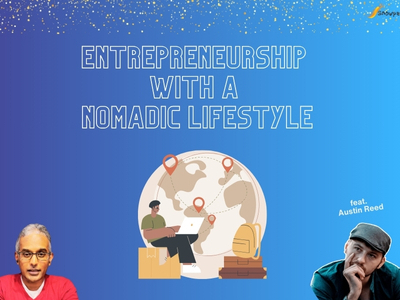Entrepreneurship with a Nomadic Lifestyle (feat. Austin Reed)
Snowpal Podcast: The nomadic lifestyle allows for flexibility and exploration, but requires effective work management.
In this episode, Austin Reed shares his experiences as a digital nomad and entrepreneur, discussing the challenges and rewards of balancing work and travel. He delves into the dynamics of remote work, the importance of flexibility, and the technical challenges faced by distributed teams. The conversation also covers API development, cultural differences in engineering, and the effectiveness of agile methodologies in a remote setting. Austin emphasizes the significance of fostering a collaborative environment and the value of constructive feedback in code reviews.
Takeaways
Austin Reed has been a digital nomad for eight years, traveling to over 26 countries.
He runs a software development agency that focuses on automating processes for businesses.
The nomadic lifestyle allows for flexibility and exploration, but requires effective work management.
Remote work dynamics differ significantly from traditional office settings, emphasizing freedom and flexibility.
Building camaraderie in remote teams is possible through shared activities and communication tools.
API development requires clear communication and collaboration between front-end and back-end teams.
Cultural differences can impact team dynamics and communication styles in engineering.
Sprints can be beneficial for complex projects but may be overkill for simpler tasks.
Code reviews should focus on constructive feedback and fostering problem-solving skills.
It's essential to establish clear specifications to avoid miscommunication during development.
Chapters
00:00 Introduction to the Nomadic Lifestyle
03:10 The Journey to Becoming a Digital Nomad
05:57 Balancing Work and Travel
09:06 Remote Work Dynamics
12:05 Technical Challenges in Remote Teams
14:46 API Development and Collaboration
17:50 Cultural Differences in Engineering
20:46 Sprints and Agile Methodologies
24:06 Code Review Practices
27:08 Final Thoughts and Reflections
Podcast
(For video version, go to Spotify or Apple)
Summary
Nomadic Lifestyle & Starting the Journey
Accidental Start: Austin’s nomadic lifestyle began after a foreign exchange in Germany during his teenage years, leading him to travel to Argentina and eventually to various countries.
Traveling & Work: Initially motivated by a dream to pursue music, Austin’s travel habits snowballed after early travel experiences with his ex-wife.
Long-Term Travel: Austin usually changes locations every 3-6 months and has now been in Buenos Aires for almost a year.
Challenges & Benefits of Remote Work
Remote Work: Austin has been working remotely for 10 years. His company offers flex time, allowing team members to work during flexible hours.
Team Dynamics: While remote, his company builds strong camaraderie, similar to in-person workplaces, using communication tools like Discord.
Challenges: Some challenges involve clarifying tasks and overcoming the lack of face-to-face communication, but the team resolves most issues with asynchronous communication.
Balancing Entrepreneurship & Nomadic Lifestyle
Work & Travel: Austin and his team travel while working. His main clients are from the US, with some from Europe, which means the time zone difference is minimal.
Technology Stack: The company primarily works with Python, Django, React, and Node, focusing on web apps, automations, and AI integrations, avoiding mobile development.
Remote Project Development Approach
Collaboration: Austin’s team uses mock APIs (e.g., Xano) to help front-end developers build without waiting for back-end components.
Process: They emphasize asynchronous communication to avoid frequent meetings and use CI/CD pipelines to ensure continuous code integration without breaking the system.
Team Structure: Teams are split into front-end and back-end roles, with some full-stack developers taking leadership responsibilities to foster growth within the team.
Client & Developer Relations
Client Base: Most clients are based in the US, with a few in Europe, making time zone coordination easier.
API Usage: Austin touches on the idea that some front-end developers are more comfortable working with fully functional or at least semi-functional APIs rather than using mock ones, as some find it difficult to build without the real endpoints.
Transcript
Podcast on Other Platforms
Austin Reed
Snowpal Products
Backends as Services on AWS Marketplace
Mobile Apps on App Store and Play Store
Education Platform for Learners and Course Creators


